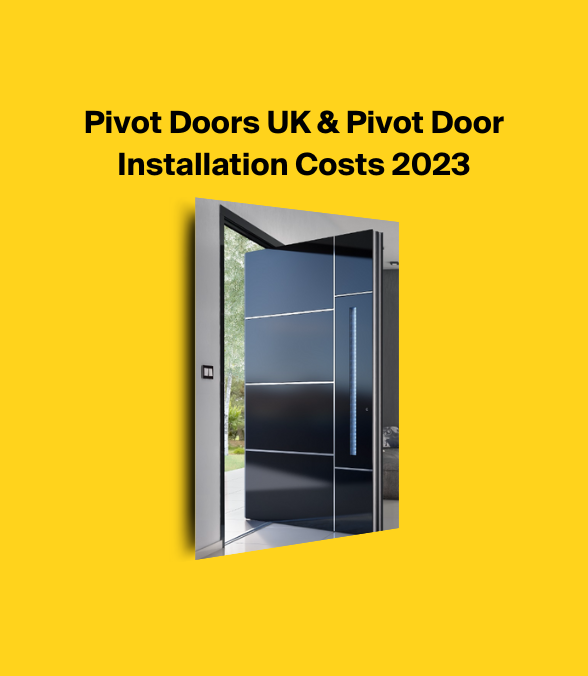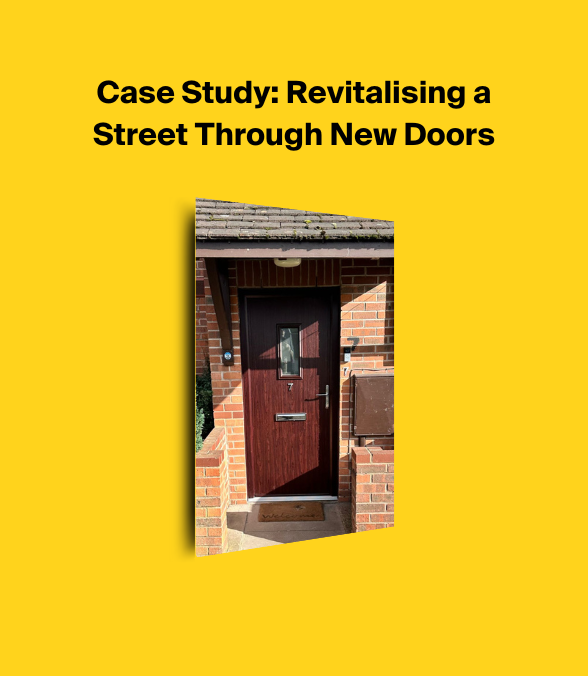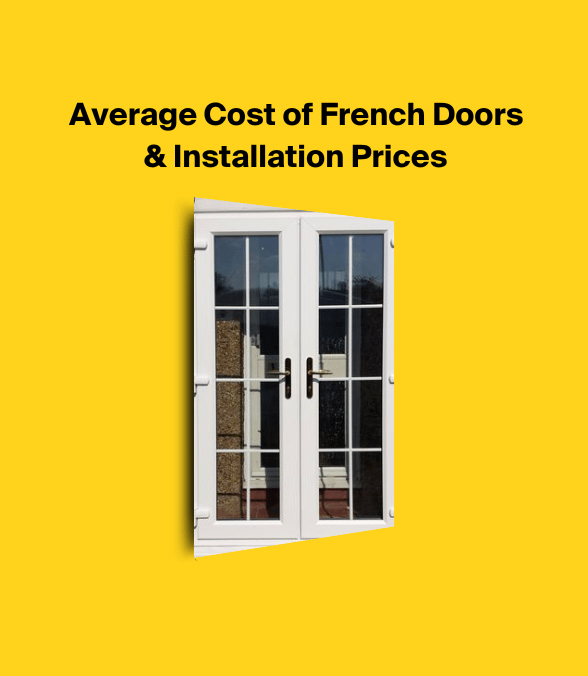All About Pivoting Doors: Everything You Need to Know
More of a speciality and statement in our opinion, pivot doors have long captivated homeowners and designers alike with their unique functionality, aesthetic appeal, and versatile material options.
Offering a stunning alternative to traditional hinged doors, pivot doors are both practical and visually striking.
In this blog post, we’ll open up and delve into the world of pivot doors, exploring their history, benefits, drawbacks, materials, and a whole host of customisation possibilities.
Let’s embark on this wide open journey to discover how these ultra sleek pivot door designs can transform your living spaces and enhance the overall design of your property.
Pivot door guide overview
- We discuss how pivot doors offer design flexibility and unobstructed views but require sufficient clearance and alignment to operate smoothly.
- Whilst various materials are available for pivot front doors, we weigh up each and look into their offerings, unique benefits and drawbacks.
- Arguably the biggest sticking point is the installation considerations such as weight, size level thresholds must be taken into account when installing a pivot door in order to comply with pesky Building Regulations.
Read more: Our guide to the best front door options in the UK right now for more information.
The Basics of Pivot Doors
They may sound like a new invention, but pivot doors have been around for centuries, with fine examples found in the ancient city of Persepolis, Iran.
What sets pivot doors apart from standard hinged doors is their unique pivot hinge system making them better for bigger doors and openings.
Instead of hinges being affixed to the side of the door, pivot hinges are located at the top and bottom, allowing the door to rotate on a vertical axis and create a distinctive pivot opening.
Pivot doors can open both inwards and outwards, offering the ultimate spectacular entrance to your home or commercial space.
However, to ensure smooth operation, sufficient clearance is necessary especially if you're planning on installing a large pivot door, making them potentially unsuitable for limited spaces.
The door's unique design offers an uninterrupted view on either side of the frame, making large premium-quality pivot doors an attractive option for modern homes and commercial spaces.
They serve as an alternative to bifold doors or patio doors.
Advantages of Choosing a Pivot Door
One of the key advantages of pivot doors is their design flexibility.
They can accommodate significantly more weight than traditional butt-hinged doors, allowing for the use of larger and heavier door panels such as aluminium and steel.
They come with all the benefits of a single-panel door, but architects and designers have more freedom to create bold, oversized doors that make a statement. Additionally, pivot hinges offer the following benefits:
- Hidden and virtually invisible, providing an unobstructed view and a minimalist aesthetic.
- They often allow for easy installation and adjustment.
- Reliable and efficient design provides smooth and effortless opening and closing movement
- Multi-use and make a stunning front door for residential and commercial buildings.
Pivot doors also offer adaptability, as they can be used in various locations within residential and commercial properties.
Whether you’re looking for an impressive entrance door or an eye-catching room divider, pivot doors can provide a stylish and functional solution.
Their unique opening mechanism allows for easy access, and their ability to carry more weight means they can be constructed from a range of materials, including glass, steel, aluminium, and wood.
Potential Drawbacks of Pivot Doors
Despite their many advantages, pivot doors also have some potential drawbacks to consider. For instance, their need for a clear pivoting area can make them unsuitable for some spaces.
Furthermore, careful attention to detail is required when installing a flush threshold to ensure the door can swing freely without obstruction.
Pivot doors may also pose a risk of finger injuries for small children and pets, as fingers can easily get pinched during the closing movement of the door.
Additionally, it’s important to exercise caution when using pivot doors in exposed locations, as they may be subjected to driving rain or high wind loads.
Before choosing a pivoting door, it’s essential to weigh the benefits and drawbacks to determine if it’s the right choice for your property.
Pivot Front Doors
Pivot front doors are an increasingly popular choice for residential and commercial properties, offering an elegant and modern entrance option.
These ultimate entrance doors make a bold statement and provide an impressive front door to any building. Pivot front doors are available in a variety of materials, such as:
- Aluminium
- Steel
- Frameless glass
- Wooden doors
Popular brands include Spitfire and RK Door Systems which we have done a mini review of further down this guide.
One notable feature of pivot front doors which is a big giveaway, is their pivot hinge system, which is designed with a special bearing in the vertical axis of rotation, making the hinges virtually invisible.
This unique door design adds to the overall aesthetic appeal of pivot front doors, making them an excellent choice for those looking to make a lasting impression with their property’s entrance.
Popular Materials for Pivot Front Doors
Pivot doors can be crafted from various materials, each offering its own set of advantages and drawbacks. Common materials for exterior pivoting doors include glass, steel, aluminium, and wood.
In the following subsections, we’ll explore each material in more detail, discussing their respective benefits and potential downsides.
Aluminium pivot doors
Aluminium pivot doors are a popular choice for modern properties due to their lightweight, durable, and low-maintenance nature.
As aluminium front doors in general can be more expensive than other materials, but their minimal upkeep requirements often make them a worthwhile investment.
Aluminium pivot doors can be customized to suit your personal style, with a range of colours and finishes available from suppliers like RK Door Systems.
Their sleek and contemporary appearance with a pivot opening makes them an attractive addition to any property.
Aluminium can be powder coated so they are usually available in any RAL colour too, so the options are endless when designing your door although often at an extra cost.
Steel pivot doors
Imagine a bank vault door, but a bit smaller and minus the spinny lock thing on the front - this is what high-quality steel pivot doors provide:
- Excellent strength and security
- A high-end option for those looking for a sleek but authentic industrial aesthetic
- The ability to be painted to match any desired colour scheme allows for added design flexibility.
However, steel pivot doors can be cumbersome and require periodic maintenance to prevent corrosion (rust).
Despite these drawbacks, steel pivot doors remain a popular choice for those seeking a durable and secure front entrance door option.
Frameless Glass pivot doors
Probably more accustomed to 5* hotels with a porter to welcome you - these minimalist and elegant, frameless glass pivot doors offer the following benefits:
- No frames mean uninterrupted views
- Seamless connection between indoor and outdoor spaces
- More than ample natural light flooding into your property, creating a bright and welcoming atmosphere.
However, frameless glass pivot doors can be more expensive than other materials and may not provide the same level of security.
If you’re looking for a door that adds a touch of sophistication and blends seamlessly into its surroundings, a frameless glass pivot door might be the perfect choice.
Wooden pivot doors
Whilst often requiring a little more TLC and looking after, wooden pivot doors offer a timeless and versatile option for those looking to add warmth and character to their property.
They can be customised with various finishes and stains to suit any design style.
Additionally, wooden pivot doors provide excellent insulation and energy efficiency, making them a practical choice for homeowners who have to have a wooden door as per building regs.
However, as we say, they do require regular maintenance to keep them looking their best and may not offer the same level of security as other materials.
Pivot Door Brands
Two leading brands in the world of pivot doors are Spitfire and RK Door Systems. Both companies offer high-quality, innovative pivot doors that cater to a range of design preferences and budgets.
In the following subsections, we’ll explore each brand in more detail, discussing their unique offerings and what sets them apart in the industry.
Spitfire Pivot Doors
Spitfire is known for their high-quality, bespoke pivot doors that focus on design and innovation.
Their unique pivot mechanism allows their doors to rotate on a central axis, creating a stunning entrance to any home or commercial space.
The Spitfire S-700 Pivot door is a popular choice in their range, offering a blend of elegance and durability.
Key Features of the Spitfire S-700 Pivot door
- Exceptional design and attention to detail
- Premium materials and construction
- Smooth and effortless operation
- Enhanced security features
- Customisable options to suit your style and preferences
While Spitfire pivot doors come at a higher price point, their exceptional design and attention to detail make them a worthwhile investment for those seeking a premium entrance solution.
RK Door Systems Pivot Doors
This pivot door company offer a wide range of aluminium pivot front doors with many features suitable for homes in the UK.
If you're looking for a unique door design then take a look at what this brand offers in terms of a great aesthetic look and durability to match.
RK Door Systems Features
- Completely customisable designs
- Peace of mind with enhanced security features
- Robust construction from aluminium for increased durability and longevity
- Various upgrades and finishes are available to suit your personal style.
RK Door Systems pivot doors also come equipped with advanced security features, such as multi-point locking systems and reinforced frames.
For a modern and secure entrance option, consider the offerings from RK Door Systems.
Customising Your Pivot Door
Personalising your pivot door is an excellent way to ensure it complements your property’s design and meets your specific needs. A variety of customisation options are available, including:
- Finishes
- Colours
- Hardware
- Smart lock features
When selecting finishes and colours, it’s important to verify your chosen options on a swatch in natural daylight to ensure accurate colour representation.
In addition to finishes and colours, you can also choose from various hardware options such as lever handles and edge pulls to enhance your door’s design.
For added convenience and extra security, why not consider incorporating modern features like in-built lighting or fingerprint recognition into your pivot door.
With so many customisation options available to homeowners in the UK, you can create a truly unique and functional entrance tailored to your home's look and needs.
Installation Considerations for Pivot Doors
If you haven't gathered by now that pivot doors are pretty heavy bits of kit, before installing a pivot door, it’s essential to consider key elements such as:
- Structural support: A lintel at the head of the door is necessary to support the pivot door’s weight.
- Drainage: Adequate drainage should be in place to prevent water infiltration underneath the door
- Level thresholds: Ensuring a level threshold is not only a good look, but it allows for smooth and unobstructed door operation.
It’s important to verify that your property’s structure can support the weight and size of your new pivot door before installation and we will always conduct a survey prior to any fitting.
Additionally, make sure the door is properly sealed to prevent air and water infiltration when it is closed.
These doors are expensive so make the most of them by taking the time to carefully plan and prepare for pivot door installation will help ensure its proper functioning and long-term durability.
Building Regulations and Compliance
When choosing and installing a pivot door, it’s important to ensure it meets current building regulations to guarantee the safety, security, and accessibility of your property.
Pivot doors must comply with Building Regulations (Part Q) to ensure the safety and security of individuals accessing the building through these doors.
Failing to meet these regulations can result in limitations on the door’s functionality and potential safety hazards.
Before installing new doors and windows, it’s advisable to consult planning guidance to determine if planning permission is necessary.
Additionally, if you’re altering your property’s exterior layout, be sure to plan in accordance with planning permission.
As well as getting a Lawful Development Certificate from your local council to verify adherence to all relevant regulations.
How Much Does a Pivot Door Cost?
The cost of a pivot door can vary depending on factors such as material, size, and customisation options. Generally, the pivot door cost is higher than that of the side-hung patio or front doors.
However, some suppliers offer them at the same price for doors above a certain width. To get an idea of the price range for pivot doors, it’s helpful to research the costs of various materials and obtain quotes from suppliers.
For example, aluminium pivot doors typically start at around £1,200 per m2, while steel-framed pivot doors have a starting cost of £3,000+ per m2.
By comparing the costs of different materials and obtaining quotes from reputable suppliers, you can make an informed decision about which pivot door option best suits your budget and design preferences.
Examples of Pivot Door Applications
The best thing about pivot doors is that they are versatile and can be used in a variety of residential and commercial applications. In most UK homes, they can serve as:
- Grand entrances
- Bathroom doors
- Pivoting walls
- Double doors
- Room dividers
Chosen by the fashion-conscious, their unique opening mechanism and stylish design make them an attractive option for creating a visually striking entrance or seamlessly dividing spaces within your home.
In commercial settings, pivot doors can be found in offices, spas, and public buildings such as libraries, restaurants, and shops.
Their ability to carry more weight and accommodate larger door panels allows for the creation of bold, oversized doors that make a statement in any environment.
Whether you’re looking for a show-stopping entrance or an eye-catching room divider, pivot doors provide a stylish and functional solution for a wide range of applications.
Maintenance Tips for Your Pivot Door
As they are pretty specialist, you may worry if they are more hassle than they are worth, but proper maintenance is essential for ensuring the longevity and appearance of your pivot door.
The specific maintenance requirements will depend on the material and finish of your door.
For wooden pivot doors, regular treatment and maintenance are necessary to prevent weathering and mismatched finishes.
It’s also important to lightly sand the door before finishing, taking into account the door’s material and colour or stain.
In addition to material-specific maintenance, there are general steps you can take to keep your pivot door in top condition. These include:
- Refraining from overextending the door
- Clearing the tracks of debris and large objects
- Inspecting the door’s hardware
- Thoroughly cleaning the door
- Examining the weather stripping
- Enhancing the door’s appearance
- Rectifying any blemishes
By following these maintenance tips, you can ensure your pivot door remains both functional and visually appealing for years to come.
Summary
Throughout this blog post, we’ve explored the fascinating world of pivot doors, examining their history, unique features, benefits, and drawbacks.
We’ve also delved into the various materials used for pivot doors, the top brands in the industry, and the customisation options available to make your pivot door truly unique.
Whether you’re considering a pivot door for your home or commercial space, it’s clear that these doors offer a stylish and functional solution that can elevate any property.
With the right information and careful planning, you can select and install the perfect pivot door to transform your space and create a lasting impression.
Frequently Asked Questions
What is a pivot door?
Pivot doors rotate on a vertical axis, with hinges mounted on the top and bottom sides of the door. This movement is visually distinct from a hinged door.
Is pivot door expensive?
Pivot doors are generally more expensive than hinge doors due to the numerous variables that affect their cost.
Material choice, size, weight, hardware, door axel positioning and swing functionality all contribute to the overall budget.
What is the advantage of a pivot door?
Pivot doors offer a convenient solution for door installation, as they require no frame.
Additionally, they offer greater clearance and smoother operation than traditional swinging doors.
Can you turn a regular door into a pivot door?
Yes, you can turn a regular door into a pivot door if the hinges can be mortised inside the door material, no matter what that material is.
A pivot door is suitable for many interior and exterior placements.
What is the main difference between pivot doors and traditional hinged doors?
Pivot doors differ from traditional hinged doors by having hinges located at the top and bottom of the door, allowing them to rotate on a vertical axis.
This type of door is becoming increasingly popular due to its sleek design and ease of use. It is also a great option for those who want to save space, as the door does not need to swing open.









